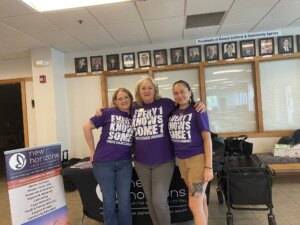New Horizons Shelter works against domestic violence
November 30, 2024
| By La Crosse Community Foundation |
Domestic violence affects victim, family, community

New Horizons Director of Programming and Personnel Heidi Svee (right) and her colleagues kick off Domestic Violence Awareness Month with the agency’s annual Dare to Self-Care event.
In La Crosse County, as in communities across the nation, sexual and domestic abuse affects thousands of individuals, many of whom suffer in silence. Research indicates that one in five women will experience physical assault by an intimate partner during her lifetime. The impact of this violence goes beyond the immediate victims — it ripples through families, neighborhoods, and the entire community, creating lasting emotional, physical, and economic scars.
New Horizons Shelter and Outreach Centers has long been an anchor in the fight to end domestic and sexual violence in La Crosse. Their mission is to provide immediate safety for those at risk and empower survivors to make informed decisions about their futures in a nonjudgmental and supportive environment. By offering services like advocacy, shelter, and education, New Horizons aims to promote non-violence and equality. Through prevention, intervention, and community education, they strive to disrupt the cycle of abuse and create a community that values safety, dignity, and respect for all.
Heidi Svee serves as director of programming and personnel at New Horizons and shares how partnerships, education, and community engagement are essential in addressing domestic violence.
What role do partnerships play in your work at New Horizons?
I was in a meeting recently where we were asked to choose a superhero name for ourselves. I chose “The Connector” because I find great joy in not only making new connections but also connecting the people in my circle to one another. In my role with New Horizons, I am fortunate to have the opportunity to collaborate with many different people across a variety of disciplines, such as other nonprofits, businesses, higher education, and folks with lived experience.
Learning from others in our community allows me to get a pulse on the needs of victims and survivors of abuse from all walks of life, which I then use when working with the team at New Horizons to develop or revise existing programs to best fit the needs of victims/survivors. Through positive connections, I am able to take my knowledge as a domestic violence advocate to educate others in our community so the relationships built are reciprocal in nature.
What are some common misconceptions about domestic violence?
Domestic violence occurs in our community due to a wide range of contributing factors, including systemic oppression of historically excluded communities, shortage of affordable and safe housing, and a lack of connection to the community or a circle of support.
Oftentimes, when folks hear the word domestic violence, they envision a woman with a black eye or other visible injury. Anyone can be a victim of domestic violence, regardless of gender identity or expression. There are also many ways in which a person can be abused. Nonphysical violence isn’t always as obvious as physical violence but can be just as damaging and traumatizing. Examples include emotional abuse and jealousy, threats, accusations and intimidation, isolation, minimizing and blaming, using children, using the patriarchy or other privilege, and financial abuse. Ultimately, the root of domestic violence is power and control, which are the tactics used by an abuser to gain and maintain control over their victim.
How can readers get involved with the work you do?
Supporting your local domestic violence organization is one of the most tangible, beneficial ways to get involved in helping to end domestic violence. Folks interested in learning more about how to volunteer to assist with the crucial advocacy work being done by New Horizons can contact Ashley, our director of community engagement, at dev@nhagainstabuse.org. Those interested in collaboration can contact me at programcoord@nhagainstabuse.org.
Domestic violence, specifically intimate partner homicide, is the most predictable type of homicide. It is also one of the most preventable. On average, it takes seven attempts to leave before someone leaves for good; however, leaving is the most dangerous time for victims. According to End Domestic Abuse Wisconsin, our state’s domestic violence coalition, “In 2022, there was one domestic violence homicide in Wisconsin every 3.8 days, putting Wisconsin 8th in the United States for death caused by domestic violence.” Simply put, domestic violence programs are homicide prevention.
Reprinted with permission from the La Crosse Tribune.
